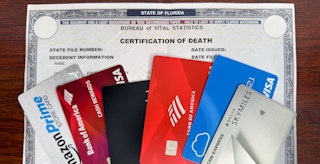We’ve all heard the urban legends: Grandpa dies, only for his family to find out he was in a ton of credit card debt, and now they’re on the hook for his outstanding bills. Surprise! But is that real? What happens to credit card debt when you die, anyway?
Now, a surprising number of people in the early 1990s weren’t aware that debtors’ prison wasn’t a thing anymore, despite the fact that it hadn’t been a thing for well over 100 years. I’ve also had more than one person trying to give me a financial education tell me that when a parent died, you inherited their debt.
But rest assured, in the vast majority of circumstances, that’s just not true. There are specific situations in certain states where you might be liable for a specific medical debt after your parent dies. That’s really only if you signed on just the right dotted line while they were still alive. But by and large, you don’t have to pay off your parents’ debt out of your own pocket when they pass away. Especially not credit card debt.
Let’s talk more about this whole post-mortem debt thing.
Download the KCL app to increase your money smarts.
What happens to credit card debt when you die?

When you die, assets you leave behind like cash, bank accounts, and physical property are all part of what’s called your estate.
If there is any money in your estate when you die, creditors do have an opportunity to claim a part of the estate to pay your debt, depending on your state’s laws. Credit card companies can be among those who seek money from your estate, though they usually have last dibs.
If there’s not any money in your estate, they can come knocking, but they aren’t entitled anything. Your family might still have to go to probate court to prove that there’s actually $0, though.
TIP: Some states require the estate to pay survivors before creditors, in which case your family would get a portion of your money before the credit card companies. This isn’t necessarily the norm, though. Check your state’s laws. Or better yet, if you have questions about estate planning, consult with an estate attorney.
Which credit card debt will my family have to pay?

That’s not to say there are zero instances where your family may have to repay your credit card debt. In the following community property states, any assets you or your spouse acquired during the marriage may partially count as a part of the estate. So if you bought a property together, some portion of the property’s value may have to go towards your debts after you die:
- Arizona
- California
- Idaho
- Louisiana
- Nevada
- New Mexico
- Texas
- Washington
- Wisconsin
And if you live in these states, you could’ve chosen to opt into community property with your spouse, but in this case it would work against you:
- Alaska
- Florida
- Kentucky
- Tennessee
- South Dakota
Even in community property states, the rules are nuanced and differ depending on where you live. If you have a creditor on your doorstep after losing a loved one, consult an attorney to make sure everything the debt collector is telling you is actually above board according to state law. You don’t want to unnecessarily sell any of your own assets to pay a debt you’re not technically liable for.
One of the only other instances where your family member may be liable for your credit card debt is if it is a joint credit card, and they were the other name on the initial application.
If I’m an authorized user on someone else’s credit card, am I liable for the debt?
Joint credit cards are much rarer than they used to be. Nowadays, if someone else has access to your credit card, it’s usually because they’ve been added as an authorized user.
Authorized users are not liable for the main account holder’s credit card debt. If you are an authorized user, be sure to stop using the card as soon as you find out about the death.
Your children should also never have to pay your credit card debt out of their own pocket, unless for some weird reason you have a joint credit card together. But usually people just add their kids as authorized users instead of opening a joint card.
RELATED: These are the best credit cards for bad credit.
Can credit card companies pay off debt with a life insurance payout?
No, credit card companies cannot take your life insurance money. That goes to your family. One of the only creditors that can lay claim to the life insurance payout is the IRS. They’re not really known to wield this power even though they technically have it. But it’s still good to try not to croak while owing back taxes. Just in case.
Do you have to repay student loans after death?

Now, hopefully, you got some of that sweet student loan forgiveness. But if you still have federal student loans when you die, your loved one can have them discharged after your death by submitting your death certificate to the Department of Education. ‘Discharged’ means you (and your estate) don’t owe them anymore — and neither will any of your family members.
Most private student loan lenders will offer death discharges, too. But if someone cosigned on the loan with you, there are a select few lenders who will still hold the cosigner liable.
RELATED: Free Stuff for College Students
How can I protect my estate from creditors?

A good way to protect your estate from credit card collectors is to have a will and an accompanying trust written by a real-life lawyer (not an online service). You want this done right beyond a shadow of a doubt, so you want it done by an experienced professional who understands your entire financial situation.
The right kind of trust can protect the assets you leave behind from credit card collectors and probate court in general.
Setting up a will and trust is an investment, but it’s one that can ensure more of the money you leave behind will go to the people you love rather than the people you owe.
Download the KCL app to add and redeem coupons in store


























































































